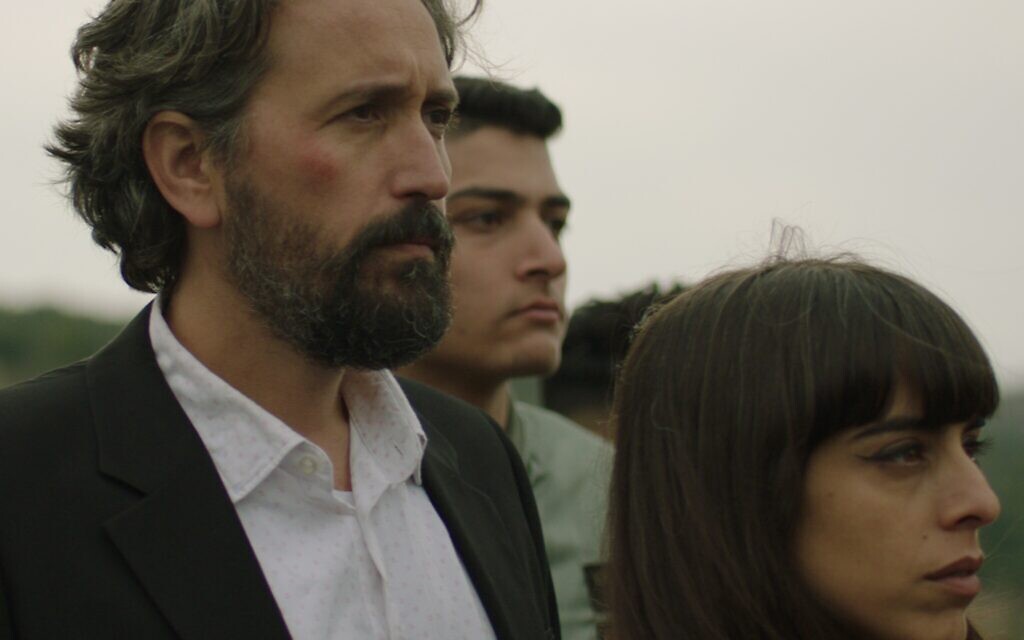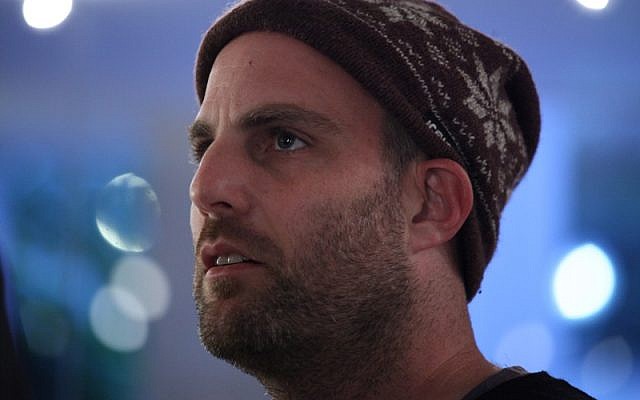Recently shown at NYC’s Other Israel festival, the Israeli director’s latest film features an all-Arab cast, won an Ophir Award, and will represent the Jewish state at the Oscars

NEW YORK — “It was an invitation for a public suicide.” That’s how Israeli film director Eran Kolirin described his decision, as a Jew, to adapt Sayed Kashua’s novel “Let It Be Morning” — the story of a Palestinian village with an all-Arab cast.
“I know the discourse. I will be hanged in the public square. But,” he added, “I was depressed at the time, and a public suicide felt like a way out.”
Death wish or not, Kolirin’s new film finds itself the winner of this year’s Ophir Award for best film. As is customary, that makes it Israel’s submission to the Academy Awards for the Best Foreign Language Oscar.
The director’s deadpan description came during a November 4 question and answer session with Columbia University’s Annette Insdorf following the movie’s United States premiere. It was also the opening night event at the 15th annual Other Israel Film Festival, a celebration held at the Marlene Meyerson JCC on Manhattan’s Upper West Side. The festival, which is designed to infuriate both hardline Zionists and anti-Israel boycotters, focuses on the stories of minorities within Israel. (I have, indeed, seen more than one Druze drama at this festival over the years.)
Following 2020’s “virtual” edition due to COVID, this year’s in-person gathering at the JCC Manhattan inaugurated a remodeled main auditorium. The Times of Israel is thrilled to report that the seats are much more comfortable now.
“Maybe films should be impossible,” Kolirin continued to joke about the difficulty of making the film. Or maybe he wasn’t joking.

Kolirin is best known for the 2007 international hit “The Band’s Visit,” which has since been adapted into an award-winning Broadway musical. Kashua is a celebrated Arab Israeli author, journalist, and humorist currently living as an expatriate in the United States. His previous work includes the television series “Arab Labor,” and his book “Dancing Arabs” was adapted into the film “A Borrowed Identity” in 2014. Though Kashua was not involved in the production, he said in an interview this summer that he loved Kolirin’s interpretation, even though it was different from the book. He called Kolirin a “sensitive, great director.”
Though “Let It Be Morning” was written years ago and shot before the pandemic, it takes on a new resonance in the post-COVID era as it portrays a community dealing with a sudden lockdown. Indeed, a throwaway scene about household cleanser — “the type of scene you don’t really need,” as Kolirin put it — secured its status during editing “once COVID came.”
Like so many great movies, things kick off at a wedding ceremony. This one is in a small Arab village somewhere, but within the official borders of the State of Israel. This will become important later as we witness the divisions between those who identify as Palestinians but retain Israeli citizenship, and the dafawnii workers from the disputed territories who are in the community but technically should not be.
Sami (Alex Bakri) is the older brother of the groom but seems more interested in sneaking off to call his mistress on the phone. (It is implied, and later confirmed, that she is Jewish.) After the festivities he, his wife Mira (Juna Suleiman), and their young son Adam start the drive back to Jerusalem, where Sami has a senior position at a company working in IT. A roadblock halts their movement (the reason is never quite clear) and cellphone communication has been cut. Sami returns to his family’s house — to the delight of his wide-eyed and terrified younger brother who seems eager for an excuse to stay away from his new bride.
One night of inconvenience stretches on for days, and through Sami we connect with the other villagers while the main family works to solve unattended problems in their own lives. The tone walks the border between existential grievance and theater of the absurd. It is not overly political because a disenfranchised fatalism is so thoroughly pounded into these people it would be hard to know where to start. And somehow there’s a sequence featuring “Chandelier” by Sia that fits perfectly.
When the movie debuted at this summer’s Cannes Film Festival, some members of the cast blanched because, due to its financing, it was listed as an Israeli film. Kolirin did not wish to continue a “boycott” narrative, saying that all who worked on the movie are proud of it, but he respects and supports any statements made by his actors. Instead he turned the question around and asked: When Martin Scorsese introduces his latest project, does he say “here is my American film”?
Whether or not the Oscars picks this “Israeli film” for its Best Foreign Language shortlist, however, is “the Academy’s business,” Kolirin laughed. Adding “if that’s the slot I am offered, I will take that slot.”
The Other Israel Film Festival, which ran from November 4 through November 11, also featured screenings of Nadav Lapid’s latest cri de coeur “Ahed’s Knee” (which shared the Grand Prix award at this year’s Cannes Film Festival) and the first three episodes of “Nafas,” the newest project from Maysaloun Hamoud.
Some of the documentaries included “The First 54 Years: An Abbreviated Manual for Military Occupation,” an anti-occupation agitprop from Avi Mograbi, “The Fourth Window,” a look at the late author Amos Oz by Yair Qedar, and “What If? Ehud Barak on War and Peace,” a fairly straightforward talking head film about the former Israeli prime minister from filmmaker Ran Tal, whose previous work includes “Garden of Eden,” a gorgeous and strange look at Gan HaShlosha National Park.
My personal favorite documentary, and one worth looking out for when it eventually comes to general release, was “Blue Box,” directed by Michal Weits, great-granddaughter of the Jewish National Fund’s Joseph Weits. In it, the filmmaker tries to unravel fact from fiction in her famous family’s history, with an eye toward neither meaningless accusations nor defeated acceptance, but a journey toward the truth. It does everything this festival is supposed to do.
As reported by The Times of Israel
